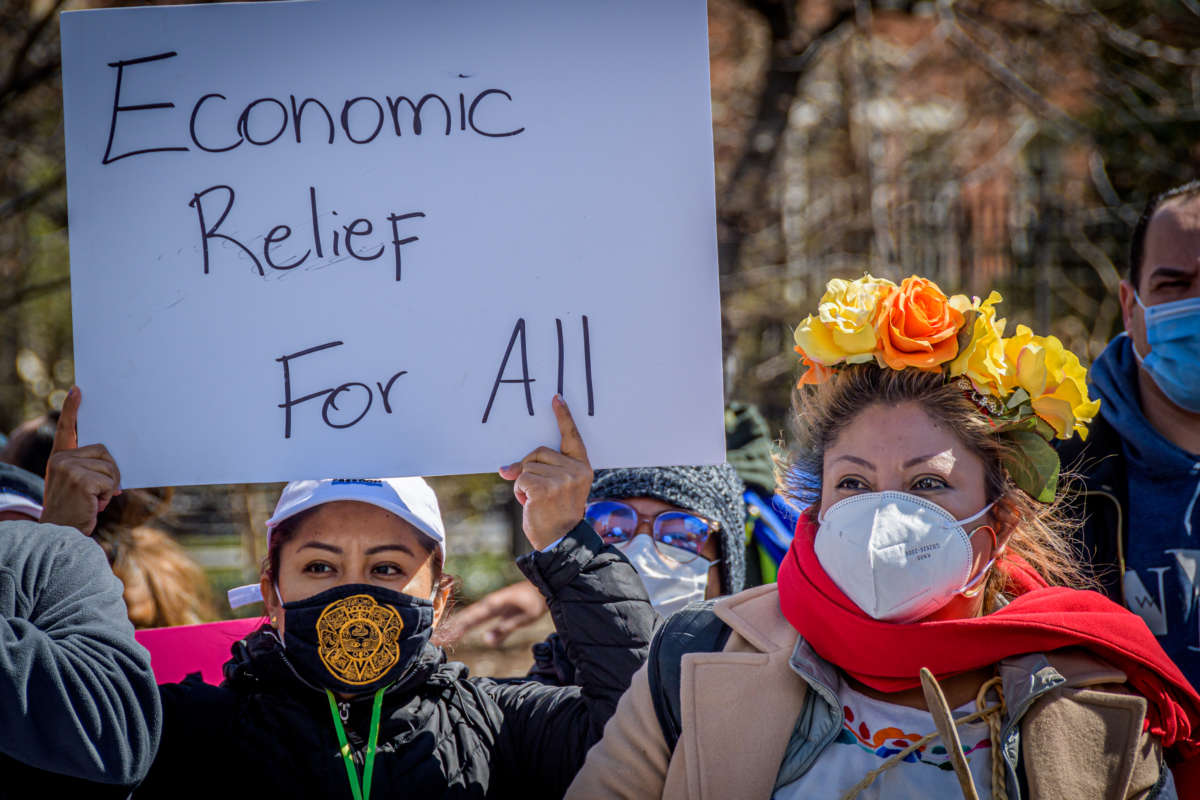Honest, paywall-free news is rare. Please support our boldly independent journalism with a donation of any size.
Esenciales por siempre. Excluidos nunca más.
Essential forever. Excluded no more, proclaimed a striking orange banner.
On March 8, this message heralded hundreds of workers, deliveristas, activists, and allies as they marched across the Brooklyn and Manhattan Bridges. The action stopped traffic for good reason: to secure $3 billion more for New York’s groundbreaking Excluded Workers Fund and a permanent unemployment program for excluded workers in the state’s budget.
Simultaneously shut down the BK and Manhattan Bridges, AGAIN! #FundExcludedWorkers #ExcludedNoMore pic.twitter.com/LWN0MzRwKM
— New York Communities for Change (@nychange) March 8, 2022
“During the pandemic, I witnessed coworkers, family members, and friends struggle to make ends meet because they were not fortunate enough to qualify for unemployment benefits,” recounted Laborers’ Local 79 organizer Alvaro Gonzalez during the march. “And when stimulus checks got around, they were still excluded from those packages. It seemed like there was no hope in sight. Then finally, the Excluded Workers Fund was created. But very quickly that hope went away: very few of the people I know actually got some funds, but the rest got told that there was no more money or they didn’t qualify. After being told that they were essential, they were left in the dark.”
Xichitl Gomez, a house cleaner, explained through translation that after she did not receive funds, she had no choice but to turn to food pantries — like countless other excluded workers before the fund’s creation.
An amazingly powerful video of Ana Ramirez, who is on Day 11 of a hunger strike today to fund excluded workers who have been left out of any relief.
She is putting her life on the line, so that so many can live with dignity. #FundExcludedWorkerspic.twitter.com/YCVorOCRpo
— New York Communities for Change (@nychange) March 26, 2021
After 23 days, the strikers successfully won $2.1 billion of state funding for excluded worker relief, breaking their fasts from wheelchairs in Washington Square Park. Next came the challenging task of implementation and application for benefits, beginning in August.
Through comprehensive eligibility vetting — requiring submission of evidence like IDs, utility bills, and employer letters — around 130,000 recipients received the maximum benefit of $15,600. Two months later, the money ran out, with 95,000 applications left unfulfilled.
While cash relief remains urgent due to the pandemic — along with skyrocketing rents and prices — the coalition’s 2022, “2.0” incarnation aims to fortify the hard-won Excluded Workers Fund with $3 billion. Their proposed legislation would earmark at least 30% of the allocated funds for communities upstate and outside of New York City, where qualified individuals were less likely to access relief in the first round, said Emma Kreyche, Director of Advocacy, Outreach, and Education at the Worker Justice Center of New York. By addressing regional disparities in access, the fund would become more equitable.
Even further, the coalition hopes to parlay their past victory into longer-term protections for excluded workers, curtailing the precarity that plagued them long before Covid-19.
“We don’t need more relief programs. We need structural change and we need equity,” said Angeles Solis, a lead organizer with Fund Excluded Workers, during a February interview with The Capitol Press Room. “We are talking about billions of dollars that have been put into social safety net programs that thousands of people cannot access. The passage of a permanent solution that will ensure that thousands of workers who contribute to our social safety net are covered in the social safety net.”
The FEW Coalition’s proposed unemployment insurance program would use similar eligibility requirements as the Excluded Workers Fund to disburse $1,200 monthly payments to below-median-earning workers whose immigration status, cash payment, self-employment, or misclassification exclude them from traditional unemployment compensation. The FEW Coalition estimates this would cost $800 million to serve 50,000 people in its first year.
Experts believe that funding excluded workers would have a significant positive effect on labor arrangements — by empowering workers and regulating contractors. The Laborer’s Local 79 union leader Mike Prohaska called the bill “commonsense” for the largely immigrant-staffed “nonunion construction workforce.”
“It will also close the gap between union and nonunion contractors, enabling undocumented workers to file for unemployment benefits, organize more freely on the job, and contribute more to our state’s economy and recovery after Covid,” Prohaska said. The law would also “level the playing field for responsible contractors who support their workers, regardless of immigration status, by paying into workers’ compensation, unemployment and payroll taxes.”
Media that fights fascism
Truthout is funded almost entirely by readers — that’s why we can speak truth to power and cut against the mainstream narrative. But independent journalists at Truthout face mounting political repression under Trump.
We rely on your support to survive McCarthyist censorship. Please make a tax-deductible one-time or monthly donation.
